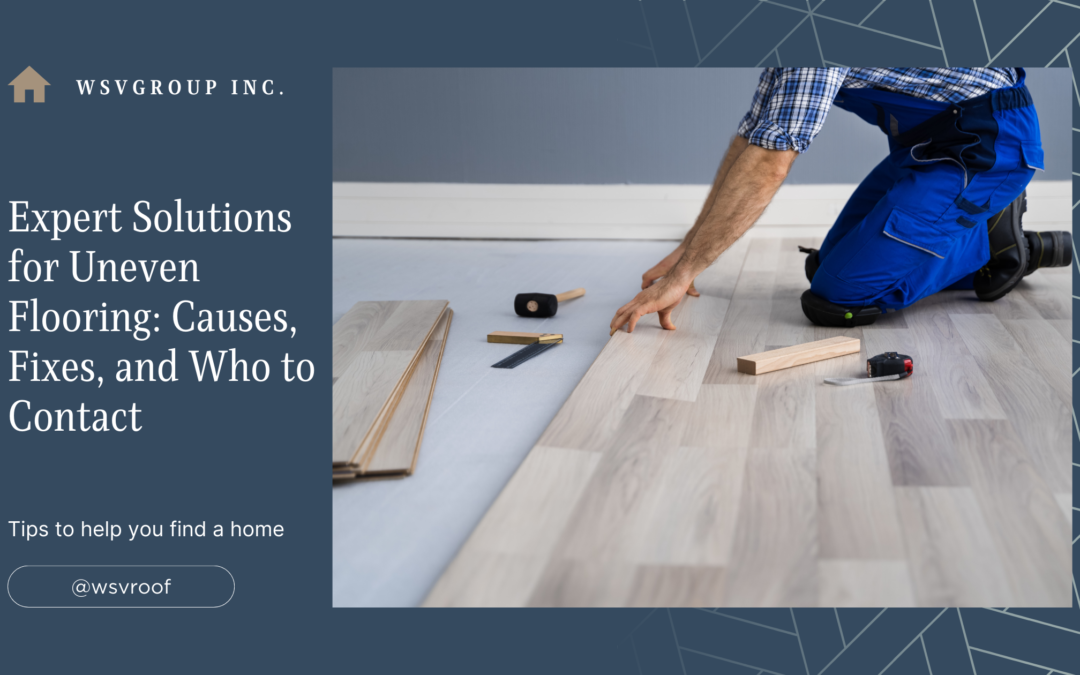Uneven flooring can be both a cosmetic and functional issue in any home or business. Not only does it affect the aesthetic appeal of your space, but it can also pose safety risks, damage furniture, and lower your property’s value. If you’re dealing with uneven floors, don’t panic! This blog will walk you through the causes, solutions, and who to call for professional assistance.
What Causes Uneven Flooring?
Before diving into solutions, it’s essential to understand the root causes of uneven floors. Common culprits include:
-
Foundation Problems: A shifting or settling foundation is the most common reason for uneven floors. Cracks, soil erosion, or improper foundation installation can lead to instability.
-
Moisture Issues: Excess moisture or leaks can cause wooden subfloors to warp or rot, leading to uneven surfaces.
-
Aging Structure: In older buildings, floors may naturally become uneven over time as materials wear down.
-
Improper Installation: Poor workmanship during construction or renovation can leave floors uneven or improperly supported.
-
Structural Damage: Events like earthquakes, heavy furniture, or improper weight distribution can lead to uneven flooring.
How to Fix Uneven Flooring
The approach to fixing uneven flooring depends on the underlying cause and the type of floor you have. Here are some common solutions:
-
Self-Leveling Compound:
- Ideal for minor dips and uneven concrete floors.
- A self-leveling compound can be poured over the floor to create a flat, smooth surface.
-
Shimming:
- For uneven wood subfloors, adding shims between the joists and flooring can even things out.
- This is best for minor discrepancies.
-
Sanding:
- If you have a wood floor, sanding down the high spots can level the surface.
- Follow up with refinishing for a seamless look.
-
Subfloor Replacement:
- In cases where moisture or age has damaged the subfloor, it may need to be replaced entirely.
- A professional can assess whether this is the best route.
-
Foundation Repair:
- If the problem lies in your foundation, you’ll need a specialist to address it. Solutions might include foundation piers, underpinning, or slabjacking to stabilize and level the foundation.
-
Floor Jacks:
- For sagging floors caused by weak joists, floor jacks can be installed to provide additional support.
-
Hire Professionals:
- DIY methods might work for minor fixes, but uneven floors often require expert intervention for a long-term solution.
Who to Call for Uneven Flooring Repairs
When dealing with uneven flooring, the type of professional you call will depend on the severity of the issue. Here’s a breakdown:
-
General Contractors:
- For larger projects, such as replacing subfloors or correcting structural issues, a general contractor like WSV Group (specializing in construction, roofing, and HVAC services) can handle the job from start to finish.
-
Foundation Specialists:
- If you suspect foundation issues, call a foundation repair company. They’ll assess the problem and recommend stabilization or leveling solutions.
-
Flooring Installers:
- If the issue is related to the surface flooring itself, such as warping or improper installation, a flooring contractor can resolve it.
-
Structural Engineers:
- For major concerns involving your home’s structural integrity, a structural engineer can provide an in-depth evaluation and recommend solutions.
-
Handyman Services:
- For minor issues like shimming or sanding, a skilled handyman may be able to resolve the problem quickly and affordably.
-
Waterproofing Experts:
- If moisture is the root cause of your uneven floors, consult waterproofing professionals to address leaks and prevent future damage.
When to Call for Help
While some uneven flooring issues can be tackled with DIY solutions, it’s important to know when to call for professional assistance. Here are some signs you need expert help:
- Visible cracks in walls, ceilings, or the floor.
- Significant slope or sagging in the floor.
- Doors and windows that stick or no longer close properly.
- Persistent moisture or water damage.
- Unevenness that affects the safety or usability of the space.
Preventing Uneven Flooring in the Future
Once your floors are fixed, take these steps to prevent future issues:
- Control Moisture: Install a dehumidifier, fix leaks promptly, and ensure proper drainage around your property.
- Inspect Regularly: Check for early signs of foundation shifts or floor warping.
- Maintain the Foundation: Address cracks or soil issues around your home as soon as they arise.
- Hire Qualified Professionals: Always work with experienced contractors to ensure quality workmanship.
Uneven floors don’t have to disrupt your life. By identifying the cause and working with the right professionals, you can restore your floors to their former glory. For expert advice or assistance, don’t hesitate to reach out to WSV Group—our team of skilled contractors is here to help you build a safe and level space.
Call us today at (727) 610-2205 or visit our website for more information!

